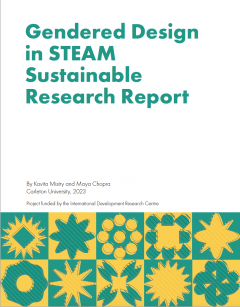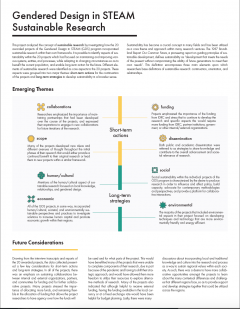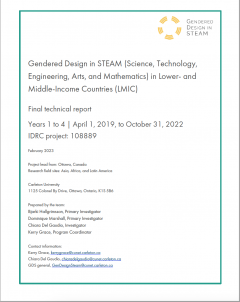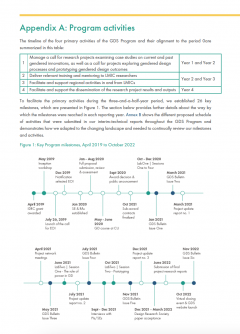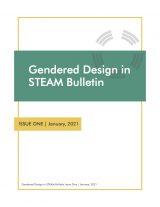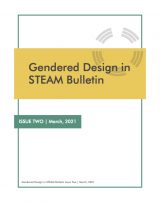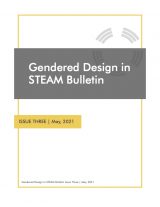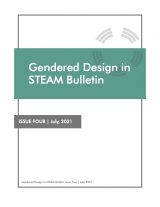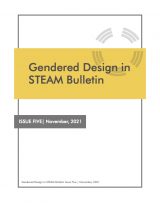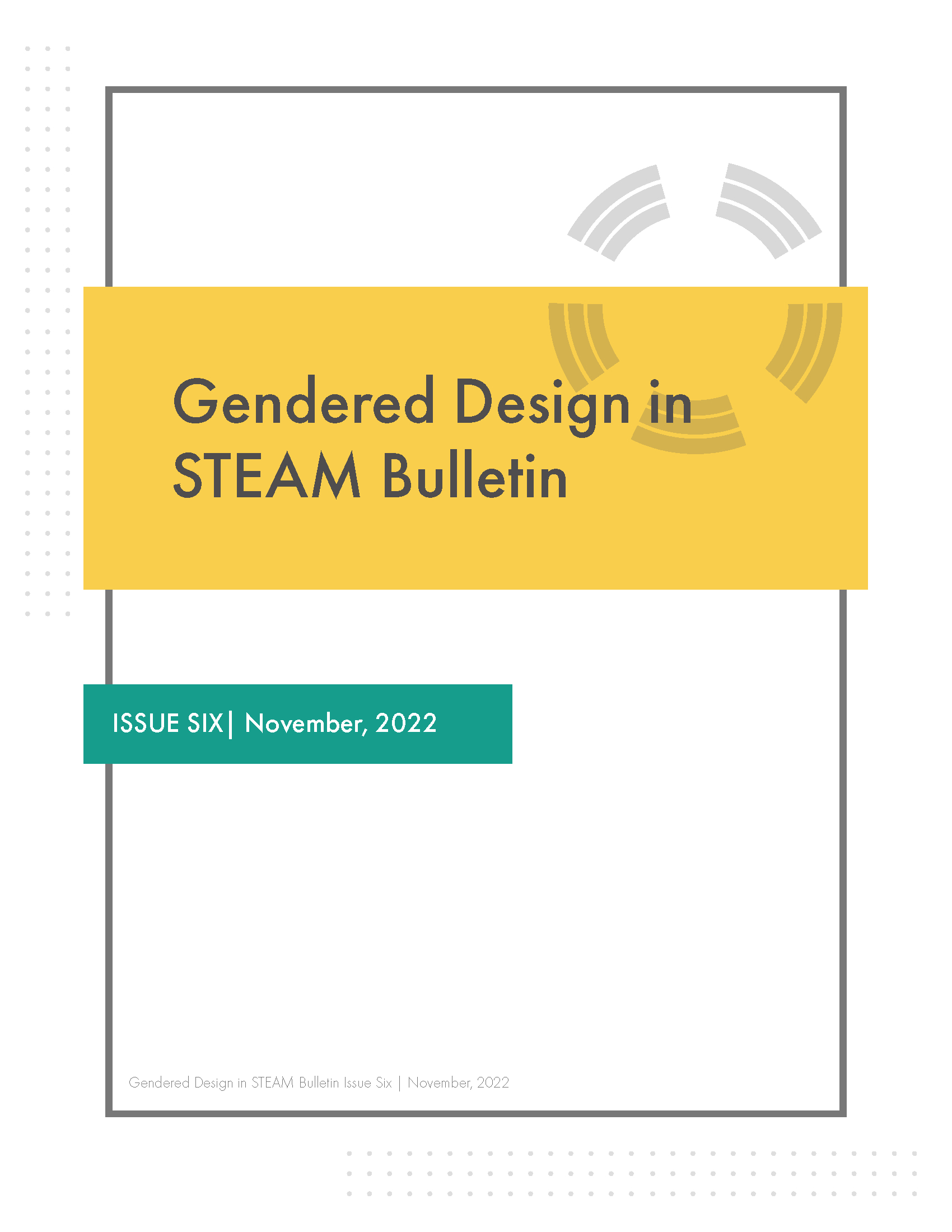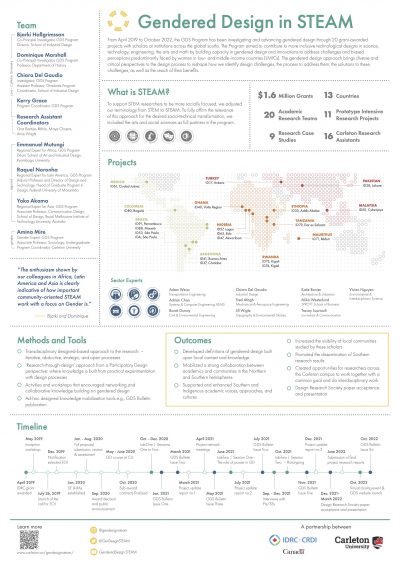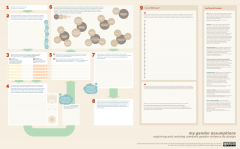Our Resource Library includes both GDS authored and affiliated resources from 2019-2022 as well as suggestions for further research in gendered design in STEAM via our Open Learning Library.
Our GDS authored and affiliated resources include:
- GDS | Exploring sustainable research
- Final Technical Report, Feb 2023
- Interview transcripts | Part 1 & 2
- Bulletins: Issues #1-6 (Jan 2021 – Nov 2022)
- Design Research Society (DRS) conference paper (June 2022)
- GDS Program poster (Oct 2022)
- Final project reports, posters and videos (Oct 2022) – by individual project
- Interactive World Map of Projects
- GDS Program toolkit
- Open Journal System (OJS) – all GDS Bulletins are viewable via the OJS for ease of open scholarly access and discussions.
The Open Learning Library is an aggregated list of resources that collect articles, books, talks, and other resources suggested by GDS participants and projects that better expand and inform conversations and planning for their gendered design process.
GDS authored & affiliated resources
Sustainable research
Final Technical Report
This is the final technical report submitted and approved by IDRC that describes the GDS Research objectives, methodology, program activities, program outputs and program outcomes. The Appendix describes in detail the program activities.
Interview transcripts | Part 1 & 2
These interviews were collected as part of the research project ‘Gendered Design in STEAM in Low and Middle Income Countries’. The project was cleared for ethics (protocol #115041) by Carleton University Research Ethics Board-B (CUREB-B) that is constituted and operates with the Tri-Council Policy Statement: Ethical Conduct for Research Involving Humans (TCPS2).
- Interview transcripts with the Principal Investigator (PI) of the awarded GDS research projects.
- Interview transcripts with the Sector Experts and Regional Experts.
Bulletins
Click on Bulletin icon below to view downloadable PDF
Design Research Society (DRS) conference paper (June 2022):
The paper, written by Chiara Del Gaudio, GDS Investigator, and PIs Bjarki Hallgrimsson and Dominique Marshall, highlights the collaborative process of continually crafting, observing, responding, testing, and tweaking at all junctions of the GDS Program journey. There are lessons learned on the methods and role of design in transdisciplinary research, knowledge production, and the process of delivering a complex program.
The paper recognized that the GDS research program required us to design and manage a global research endeavour extending across three continents, consisting of distinct projects with shared goals and different disciplinary backgrounds, sectors, and socio-cultural contexts. Presentation slides.
Del Gaudio, C., Hallgrimsson, B. and Marshall, D. (2022 June 25). Supporting research on gender and design amongst STEAM researchers in the souths: A case study of subsumption in design methods DRS Digital Library, DRS Biennial Conference Series.
GDS Program poster (Oct 2022)
Click on Poster icon below to view downloadable PDF
Final project reports, posters and videos – by individual project:
Africa
- ETHIOPIA ID33 | Addis Ababa University Improving access to financial services for women in Ethiopia
- GHANA ID40 | University of Energy and Natural Resources Assessing the impact of solar panels to improve energy access for women
- NIGERIA ID47 | University of Uyo Improving the design of upland fish drying technology for female fish vendors
- NIGERIA ID57 | Lagos State University Developing a hybrid fish dryer to improve processing for small-scale female processors
- NIGERIA ID65 | Edo State Polytechnic Usen Constructing an eco-friendly generator for low-income female artisans
- MAURITIUS ID71 | University of Mauritius Developing small wind turbines with local women for domestic use
- RWANDA ID73 | University of Rwanda Improving the design process for housing and public spaces based on women’s experiences
- RWANDA ID74 | University of Rwanda Improving transportation systems for women in Rwanda
- TANZANIA ID79 | University of Dar es Salaam Modernizing the batik industry to improve income for women in Tanzania
Asia
- TURKEY ID17 | Middle East Technical University (METU) Improving the design of public transport based on women’s experiences
- PAKISTAN ID38 | Lahore University of Management Sciences (LUMS) Designing support services for women experiencing workplace harassment
- MALAYSIA ID50 | Multimedia University (MMU) Designing mobile services for ageing women
Latin America
- ARGENTINA ID37 | Centro de Intercambio y Servicios Para el Cono Sur Argentina (CISCSA) – Ciudad Feminista Exploring urban childcare infrastructures to support women’s autonomy in Argentina
- ARGENTINA ID41 | Universidad de Buenos Aires (UBA) Re/designing the University of Buenos Aires campus to be gender inclusive in Argentina
- BRAZIL ID53 | Universidade Estadual Paulista (UNESP) A case study of clothing design considerations of low-income, menopausal women in Brazil
- BRAZIL ID88 | Universidade Federal de Alagoas (FAU/UFAL) Developing new construction techniques based on the work of women in Brazil
- BRAZIL ID91 | Fundação de Apoio ao Desenvolvimento da Universidade Federal de Pernambuco (FADE-UFPE) Studying the use of artifacts to rebuild self-image and identity among female breast cancer survivors in Brazil
- BRAZIL IDA | Universidade Federal de São Paulo (UNIFESP) 3D-printed prostheses to support female survivors of domestic violence, accidents or cancer treatment in Brazil
- COLOMBIA ID80 | Universidad de Bogotá Jorge Tadeo Lozano (UTADEO) Reimagining urban territories for women’s autonomy in Colombia
- MEXICO ID61 | Universidad Autónoma de Ciudad Juárez (UACJ) Developing innovative urban design strategies to combat gender violence in Mexico
Interactive world map of projects:
View a full screen version of Interactive world map of projects
GDS Program toolkit:
- Interview guide: This is the interview guide used for the interviews conducted with the research project PIs. This follows the principles of an oral history interview. Reuse of this interview in any way must include the following citation: Marshall, D. & Del Gaudio, C. (2021) Gendered Design in STEAM Program, Carleton University
- Miro boards: These boards were created to support the activities during LabOne and LabTwo | Session Two. Except where otherwise noted, this work is licensed under https://creativecommons.org/licenses/by-nc-nd/4.0/ © 2023, Gendered Design in STEAM (GDS). Some Rights Reserved.
- LabOne | Board 1: Organizing research project
- LabOne | Board 2: Exploring ‘What to who, by who’
- LabOne | Board 3a: Exploring ‘How, with and who’
- LabOne | Board 3b: Exploring ‘How, with and who’ (prototyping)
- LabOne | Board 4: Theoretical mind map
- LabOne | Board 6: What is gendered design
- LabOne | Board 7: Research contribution to gendered design
- LabOne | Board 8: Methods researching gendered design
- LabOne | Board 9: Local context
- LabOne | Board 11a: Updating research process
- LabOne | Board 11b: updating design process
- LabTwo | Session Two: Activity 1
- LabTwo | Session Two: Activity 2
- Gender assumptions toolkit: My Gender Assumptions is a research project, led by Chiara Del Gaudio from Carleton University, that aims to support designers in identifying the gender assumptions and biases that they bring to their design processes, and in better understanding the performative nature of gender. A process was designed and piloted with undergraduate Industrial Design students. The materials designed are available here for whoever would like to use them in their classroom or to better understand their own design processes.
Open Journal Systems (OJS)
All GDS Bulletins are now viewable via the Open Journal Systems (OJS) for ease of open scholarly access and discussions. OJS is indexed by Google Scholar and all GDS bulletins are findable through Google Scholar searches. Additional individual articles based on the GDS research are coming soon.
Open Learning Library – Suggested resources for further research
Articles:
Barclay, K. & Garcia Garcia, S. (2020) ‘Adapting Research Methodologies in the COVID-19 Pandemic’. University of Technology Sydney (UTS) & Nippon Foundation Ocean Nexus Center at the University of Washington, EarthLab. (EarthLab)
This report provides an overview of alternative qualitative and quantitative research methods, insights from researchers gathered through interviews, and a selection of online discussions and resources on how this adaptation is taking place in the near future.
Bratteteig, T. and Wagner, I. (2012). ‘Disentangling power and decision-making in participatory design’. In K. Halskov, H. Winschiers-Theophilus, Y. Lee, J. Simonsen, & K. Bødker. PDC 2012 Embracing New Territories of Participation. Proceedings of the 12th Participatory Design Conference. Volume 1: Research Papers (pp. 41-50). ACM Digital Library (WorldCat)
Buchanan, R. (2001). ‘Design Research and the New Learning’. Design Issues, 17(4):3-23. DOI: 10.1162/07479360152681056
This article provides a brief overview of design, its origins, definitions, and highlights the overall value of design as a discipline and practice. The author aims to address the uncertainty about whether design knowledge merits serious attention and argues that there is a revolution happening in design thinking and the field of design.
Büssers et al. (eds.), (2021). ‘Gendered Configurations of Humans and Machines: Interdisciplinary Contributions’. Verlag Barbara Budrich. DOI: 10.3224/84742494
This volume provides an interdiscplinary approach towards questions of how do digitalization and artificial intelligence affect gender relations and how intersectionality can be newly understood in an increasingly internationally networked world. This volume is a collection of contributions deriving from the ‘Interdisciplinary Conference on the Relations of Humans, Machines and Gender’ which took place in Braunschweig (October 16-19, 2019)
Costanza-Chock, S. (2018). ‘Design Justice: towards an intersectional feminist framework for design theory and practice’. Proceedings of the Design Research Society 2018. Social Science Research Network (SSRN)
This article begins with a background on the concepts of intersectionality and the matrix domination. The article proposes a definition of design justice as a framework and expands on the design justice principles.
Del Gaudio, C., Oliveira, J.A., & Franzato, C. (2014). ‘The influence of local powers on participatory design processes in marginalized conflict areas’. In K O. S. Iversen, H. Winschiers-Theophilus, V. D’Andrea, A. Clement, A. Botero, & K. Bødker. PDC 2014 Reflecting connectedness. Proceedings of the 13th Participatory Design Conference Volume 1: Research Papers (pp. 131-139). ACM Digital Library (WorldCat)
Hall, J., Gaved, M., & Sargent, J. (2021). Participatory Research Approaches in Times of Covid-19: A Narrative Literature Review. International Journal of Qualitative Methods, 20: 1-15. Sage Publications (WorldCat)
This review discusses current literature on the use of participatory research methods during Covid-19 and pandemic contexts. The review provides an overview on how various methods may be used and adapted for distanced contexts and considers the challenges of researching during the Covid-19 pandemic.
Jung, H. (2014). ‘Let Their Voices Be Seen: Exploring Mental Mapping as a Feminist Visual Methodology for the Study of Migrant Women’. International Journal of Urban and Regional Research, 38(3): 985-1002. DOI: 10.1111/1468-2427.12004 (WorldCat)
A piece on how easy it is to misunderstand the intentions of people who are participating in a project at a disadvantage, for example due to power imbalances and language barriers, and to underestimate and patronise migrant women. The researcher describes their project that involved interviewing migrant women with sketching and mapping methods.
Kallitsis, P., Soilemezi, D. & Maguire Elliott, A. (2018) ‘Disabling spaces and spatial strategies: Feminist approaches to the home environment of family caregivers of people with dementia.’ Home Cultures 15(3): 265–287 (WorldCat)
The paper looks at methods of investigating people’s relationship with the home environment. Using a gender-based perspective, the authors analyzed thirteen interviews with family caregivers to understand how they perceived their home space. Given the gendered nature of caring, the findings are discussed drawing on the work of feminist architects regarding the home environment.
Light, A. and Akama, Y. (2012). ‘The human touch: participatory practice and the role of facilitation in designing with communities’. In K. Halskov, H. Winschiers-Theophilus, Y. Lee, J. Simonsen, & K. Bødker. PDC 2012 Embracing New Territories of Participation. Proceedings of the 12th Participatory Design Conference. Volume 1: Research Papers (pp. 61- 70). ACM Digital Library (WorldCat)
Lupton, D. (ed) (2020). Doing fieldwork in a pandemic. Revised 2021. (crowd-sourced document)
This document was initially intended to focus on how to turn fieldwork that used face-to-face methods into a more ‘hands-off’ mode. However, the document has grown with many additions focused on material about ‘born digital’ research (content already generated on the internet by online interactions), which provides an alternative source of social research materials.
Maharawal, M. & McElroy, E. (2018) ‘The anti-eviction mapping project: Counter mapping and oral history toward Bay Area housing justice.’ Annals of the American Association of Geographers, 108(2): 380-389 (WorldCat)
Explores the importance of community involvement in research, and for projects to directly benefit the communities it works with, and advance activism taking place on the ground.
Mazé, R. (2019). ‘Politics of Designing Visions of the Future’. Journal of Futures Studies, 23(3): 23–28. DOI: 10.6531/JFS.201903_23(3).0003. (WorldCat)
This paper examines the relationship between the political aspects of design and design futures.
Onafuwa, D. (2018). ‘Allies and Decoloniality: A review of the Intersectional Perspectives on Design, Politics, and Power Symposium’. Design and Culture, 10(1): 7–15. DOI: 10.1080/17547075.2018.1430995 (WorldCat)
This article reviews the Intersectional Perspectives on Design, Politics, and Power Symposium which was organized by the Decolonising Design Group. The conference examined the theory of intersectionality, cultural oppression in design, and the call for decolonization in design.
Oudshoorn, N., Rommes, E. and Stienstra, M. (2004). ‘Configuring the User as Everybody: Gender and Design Cultures in Information and Communication Technologies’. Science Technology and Human Values 29 (1): 30–63
The article shows how configuring the user as ‘everybody’ and the use of the ‘I-methodology’ are important constraints in the development of technologies that aim to reach users in all their diversity.
Pecis, L. (2016). ‘Doing and Undoing Gender in Innovation: Femininities and Masculinities in Innovation Processes’. Human Relations, 69 (11), 2117-2140. Sage Publications. DOI: 10.1177/0018726716634445. (WorldCat)
This article contributes towards developing a gendered understanding of innovation by introducing the term ‘positions of displacement’ to signal the fluidity and messiness of doings and undoings of femininities and masculinities through innovation practices.
Rossi, E., Di Nicolantonio, M., Ceschin, F., Mincolelli, G., Dos Santos, A., Kohtala, C., Jacques, E., Cipolla, C., Manzini, E. (2020). ‘Design Contributions for the COVID-19 Global Emergency (Part 1): Empirical Approaches and First Solutions’. Strategic Design Research Journal 13 (3). DOI 10.4013/sdrj.2020.133.01. (WorldCat)
Rossi, E., Di Nicolantonio, M., Ceschin, F., Mincolelli, G., Dos Santos, A., Kohtala, C., Jacques, E., Cipolla, C., Manzini, E. (2021). ‘Design Contributions for the COVID-19 Global Emergency (Part 2): Methodological Reflections and Future Visions’. Strategic Design Research Journal 14 (1). DOI 10.4013/sdrj.2021.141.01. (WorldCat)
The above two articles forms a special issue that presents a peer-reviewed sample of initiatives led by designers across various disciplines engaging in strategic problem solving during a global pandemic. Part 1 focuses on papers dedicated to empirical contributions, with direct accounts of the hands-on activities of designers in different contexts. Part 2 focuses on the theory underpinning the practical experiences and methodological reflections concerning the role of design during the pandemic.
Schwittay, A. (2019). ‘Designing urban women’s safety: An empirical study of inclusive innovation through a gender transformation lens.’ European Journal of Development Research, 31(4): 836-854 (WorldCat)
Selvi Ünlü, T. (2019) ‘Urban memory and planning: Investigating the use of oral history.’ European Planning Studies 27(4): 802-817 (WorldCat)
Understanding how people experience and perceive space, and how it relates to identity, in order to conduct ethical and meaningful urban planning.
Sultana, S., Guimbretière, F., Sengers, P., & Dell, N. (2018). ‘Design Within a Patriarchal Society: Opportunities and Challenges in Designing for Rural Women in Bangladesh’. Proceedings of the 2018 CHI Conference on Human Factors in Computing Systems. (536: 1–13). ACM Digital Library. DOI: 10.1145/3173574.3174110. (WorldCat)
This paper highlights how design can enable empowerment by working within the patriarchal systems. It specifically discusses Bangladesh as a case study, but may have implications for gendered design in the global south.
Sunikka-Blank, M., Bardhan, R. & Nasra Haque, A. (2019) ‘Gender, domestic energy and design of inclusive low-income habitats: A case of slum rehabilitation housing in Mumbai, India.’ Energy Research & Social Science 49: 53–67 (WorldCat)
Women’s involvement in decision-making in domestic energy remains under-researched. This research adopts a gendered perspective to explore women’s household and working practices and uses a survey, a focus group discussion, interview narratives and systems analysis.
Strachan, A.L. (2021). Impact of COVID-19 on research methods and approaches, Covid Collective Helpdesk Report 2. Institute of Development Studies. Brighton, UK. DOI: 10.19088/CC.2021.002 (OpenDocs)
This document provides a brief overview of the challenges and impacts on researching during the Covid-19 pandemic. The document also highlights opportunities and positive aspects of remote data collection.
Vossenberg, S. (2018) ‘Frugal innovation through a gender lens: Towards an analytical framework.’ European Journal of Development Research 30(1): 34–48 (WorldCat)
This article analyzes the role of frugal innovation processes as a potential means to empowerment and enhanced wellbeing of marginalized women. The key focus is on exploring when frugal innovations are more likely to reproduce or transform institutionalized gender-related constraints that structure how men and women can access resources and opportunities.
Books:
Binder, T., De Michelis, G., Ehn, P., Jacucci, G., Linde, P. & Wagner, I. (2011). ‘Design Things’. The MIT Press (WorldCat)
Franklin, U. (1999 [2014]) ‘The real world of technology (revised edition)’. Toronto: House of Anansi Press Limited (WorldCat)
Hallgrimsson, B. (2019) ‘Prototyping and Modelmaking for Product Design’. 2nd edition. Lawrence King Publishers (WorldCat)
The book illustrates how prototypes are used to help designers understand problems better, explore more imaginative solutions, investigate human interaction more fully and test functionality so as to de-risk the design process.
Marshall, D. (2021). ‘Conclusion: Breaking historiographic Barriers’, in Campbell-Miller. J., Donaghy, G. & Barker, S. (Eds.), Breaking Barriers, Shaping Worlds: Canadian Women and the Search for Global Order. UBC Press (WorldCat)
This book brings together a range of contributors in a comprehensive exploration of the role of women in 20th Century Canadian International Affairs. It examines the lives and careers of women who have made an impact.
Rogers, Y., Sharp, H., & Preece, J. (2011). ‘Chapter 11: Design, Prototyping, and Construction’. in Interaction Design – Beyond Human Computer Interaction. 3rd ed. (online) or 4th ed. (print). John Wiley & Sons, West Sussex.
Chapter 11 explores different types of prototyping activities, explains the use of scenarios and prototypes in design and aims to provide the knowledge to enable you to produce simple prototypes from the models developed during the requirements activity, and to produce a conceptual model for a product and justify your choices. The textbook overall offers a cross-disciplinary, practical and process-oriented introduction to the field, showing what principles ought to apply to interaction design and crucially how they can be applied.
Simonsen, J., & Robertson, T. (Eds.) (2013a). Routledge International Handbook of Participatory Design. Routledge. Simonsen, J., & Robertson, T. (2013b). Participatory Design: An introduction. In Simonsen, J., & Robertson, T. (Eds.) (WorldCat)
The Handbook brings together a multidisciplinary and international group of highly recognized and experienced experts to present an authoritative overview of the field and its history and discuss contributions and challenges of the pivotal issues in participatory design, including heritage, ethics, ethnography, methods, tools and techniques and community involvement.
Wensveen, S.A.G., & Matthews, B. (2014). ‘Prototypes and prototyping in design research’. in Rodgers P.A. & Yee, J.(eds.) The Routledge Companion to Design Research. (14th ed., pg 262-276). (WorldCat)
This chapter focuses on the roles of prototypes as vehicles for research about, for and through design. The authors focus on prototyping within research processes that necessarily involve design activities, which they refer to as constructive design research.
Presentations and talks:
‘Transport justice in South Africa – mapping the gendered impact of transport policy in Johannesburg’. (January 13, 2021). Talk by Trinish Padayachee (@TrinishP); presentation hosted by Institute of African Studies (IAS) at Carleton University. Watch the talk: https://youtu.be/x–6ktUEeWU
‘Imagining a Just City’. (January 19, 2021). Roundtable discussion hosted by The Faculty of Arts and Sciences at Carleton University. The panel discussed ideas, actions and practices related to: housing for people not profit, caring communities, and feminist, anti-colonial and anti- racist planning and city-making in Ottawa in times of Covid-19 and beyond. Watch the Roundtable: https://carleton.ca/fass/events/healthy-cities/
The Virtual Design Festival (2020) in collaboration with What Design Can Do hosted live talks on: Decolonising Design, Gender Equality, and Social Justice.

